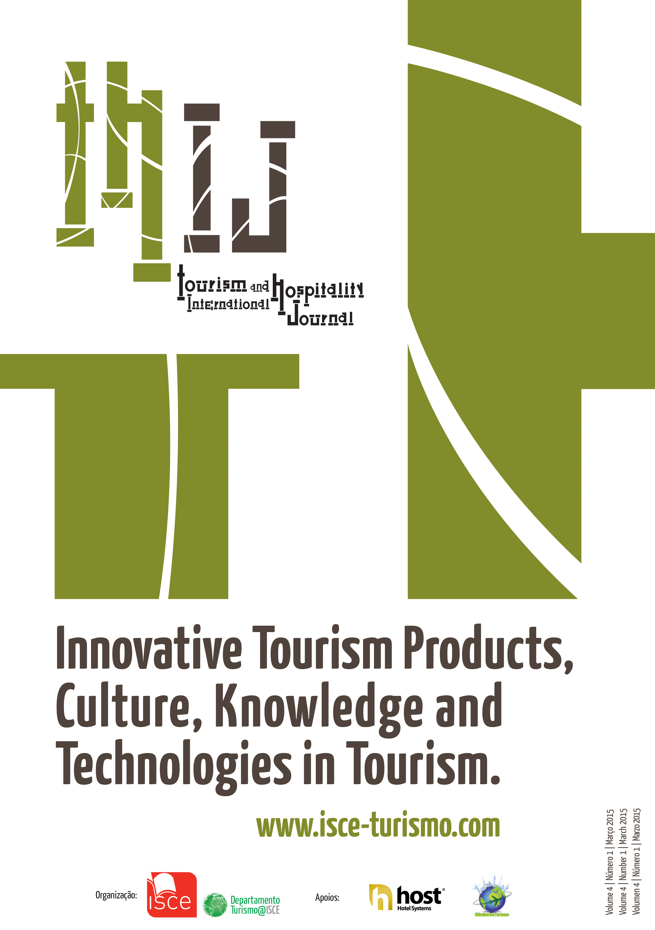The influence of the use of information technology systems in the decision making of rural tourism managers. An approach of the Algarve region
DOI:
https://doi.org/10.57883/thij4(1)2015.30258Keywords:
Information system, Information technology, Decision making process in rural organization, Rural tourismAbstract
The use of technologies’ information system is considered by many authors as a vector of rural organization growing; its uses for a competitive increase in comparison with others organizations where the uses of information system technologies’ are less frequent or inexistent. Thus, it is important identify which technologies’ information System are used in rural areas and its impact on organizations. This study was focused on rural organization in Algarve Region and intends to identify the uses of technologies’ information System impact on decision making. The study was direct to 51 rural tourism organization owners which use internet page and email. The data was made through an electronic questionnaire and a qualitative analysis. From the 25 answers we concluded that the uses of information system technologies’ allowed reliability on decision making process within organization’s because identified problems, gives short time answer. Thus it is possible that information technologies’ uses conduce to a positive impact on rural organizations in Algarve region, although it’s important to investigate other factors, such as competitiveness between organizations and the costs associated with a new business methodology.
References
Amaral, L. et al. (2005). Sistemas de informação organizacionais (1ª ed.). Lisboa: Edições Sílabo
Beldona, S. & Cai, L. A. (2006). January. An exploratory evaluation of rural tourism websites. Journal of Convention and Event Tourism, 8(1). 69-80.
Bernardo, M. D. R. A. D. (2006). Os agentes de software e o processo de tomada de decisão: Estudo empírico do impacto de um shopbot. Tese de Doutoramento, Instituto Superior de Economia e Gestão. Universidade Técnica de Lisboa.
Bhatt, G. D., Grover, V. & GROVER, V. (2005). Types of information technology capabilities and their role in competitive advantage: an empirical study. Journal of Management Information Systems, 22(2), 253-277.
Buhalis, D. & Law, R. (2008). Progress in information technology and tourism management: 20 years on and 10 years after the internet - the state of etourism research. Tourism Management, 29, 609-623.
Capucha, L. M. A. (1996). Fazer render o belo-questões à volta do turismo e do desenvolvimento em zonas rurais recuadas. Sociologia - Problemas e práticas, 21, 29-46.
Courtney, J. F. (2001). Decision making and knowledge management in inquiring organizations: Toward a new decision - making paradigm for DSS. Decision Support System, 31(1), 17-38.
Eusébio, M. C. D. A. (2006). Avaliação do impacte económico do turismo a nível regional: O caso da Região Centro de Portugal. Tese de Doutoramento. Universidade de Aveiro.
Hays, S., Page, S. J. & Buhalis, D. (2013). Social media as a destination marketing tool: Its use by national tourism organisations. Current Issues in Tourism, 16(3), 211-239.
Harrison, E. F. & Pelletier, M. A. (2000). The essence of management decision. Management Decision, 38(7), 462-470.
López, Y, (2013). Sistemas de informação para gestão. Lisboa: Escolar editora.
Lopes, F. C. et al. (2009). Desenvolvimento de sistemas de informação (2ª ed.). Editora FCA.
Martin, L. M. (2004). E-innovation: Internet impacts on small UK hospitality firms. International Journal of Contemporary Hospitality Management, 16(2), 82-90.
Mehrtens, J. et al. (2001). A model of internet adoption by SMEs. Information and Management, 39, 165-176.
Pereira, M.J. (2005). Sistemas de informação: Uma abordagem sistémica. Lisboa. Campus do Saber- Universidade Católica Editora.
Teixeira, S. (1998). Gestão das Organizações. Lisboa: McGraw- Hill.
Turismo de Portugal (2008). PENT - Plano Estratégico Nacional do Turismo. Para o desenvolvimento do turismo em Portugal. Retirado de http://www.turismodeportugal.pt/Portugu%C3%AAs/conhecimento/planoestrategiconacionaldoturismo/Anexos/PENT_VERSAO_REVISTA_PT.pdf
Ramos, C. et al. (2008). Sistemas de informação para o apoio ao turismo, o caso dos Dynamic Package. Revista Ibérica de Sistemas e Tecnologias de Informação, 2, 25-34.
Reichel, et al., (2000). Rural tourism in Israel: Service quality and orientation. Tourism Management, 21(5), 451-459.
Reis, A. (1999). Sistemas de decisão. Lisboa: Universidade Aberta
Santos, A. C. F. (2012). Estratégias competitivas nos sítios eletrónicos das farmácias de oficina com dispensa ao domicílio. Dissertação de Mestrado. Universidade Aberta.
Serra, J. (2008). As tecnologias de informação e comunicação no turismo: A emergência do e-tourism. Retirado de http://hdl.handle.net /10174/2671
Sigala, M. (2004). Customer relationship management (CRM) evaluation: Diffusing CRM benefits into business processes. ECIS 2004 Proceedings. Retirado de http://aisel.aisnet.org /ecis2004/172.
Silva, G. et al. (2003). Oportunidades e constrangimentos ao desenvolvimento do turismo rural. In: O. Simões & A. Cristóvão (eds.). Turismo em espaços rurais e naturais (TERN) (pp.217-227). Coimbra: Instituto Politécnico de Coimbra.
Swanson, E. B. (1994). Information system innovation among organizations. Management Science Review, 40(9), 1069-1092.
Turban, E. et al. (2007). Introdução a sistemas de informação. São Paulo: Editora Campos/Elsevier.
Wöber, K. W. (2004). Evaluation of DMO web sites through interregional tourism portals: An european cities tourism case example. ICIAR 2004, 1, 212.
Downloads
Published
How to Cite
Issue
Section
License
Copyright (c) 2023 This work is licensed under a Creative Commons - Attribution 4.0 International (CC BY 4.0)

This work is licensed under a Creative Commons Attribution 4.0 International License.
This work is published under the Creative Commons Attribution 4.0 International License.







